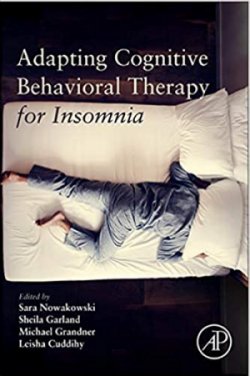
NOW AVAILABLE!
Adapting Cognitive Behavioral Therapy for Insomnia
This is a textbook aimed at clinicians (psychologists, physicians, social workers, therapists, nurses, etc.) who are either treating insomnia in their clinics or studying insomnia in their research programs. It is especially geared towards people already working in Behavioral Sleep Medicine and who already know the basics of Cognitive Behavioral Therapy for Insomnia (CBT-I). This book picks up where all the other manuals leave off and addresses strategies for adapting and modifying the standard CBT-I approaches for a wide variet of different types of patients.
Buy it on the Academic Press / Elsevier website directly or on Amazon. Anyone with an academic affiliation can probably access it for free through your institution on ScienceDirect.
Intersted in using this book for a class or seminar? Interested in a signed copy? Any other questions? Contact Dr. Grandner.
This is not a self-help book about sleep. This is an academic textbook about how sleep is related to health across a wide range of topics.
Cognitive Behavioral Therapy for Insomnia (CBT-I) has emerged as the standard first-line treatment for insomnia. Patients are becoming increasingly complex as referrals for CBT-I become more widespread, and they often present with more than one comorbid psychological and/or medical condition. The busy clinician desires a reference book that they can consult to guide treatment based on the specific needs of the client in front of them. This book will allow for the clinician who is already familiar with the basics of CBT-I to quickly determine how best to deliver and/or modify it depending on the unique needs of their client or patient population.
Table of Contents
Part I: Traditional CBT-I Components and Delivery
1. Standard Cognitive Behavioral Therapy for Insomnia (CBT-I)
Alexandria Muench, Ivan Vargas, Donn Posner, and Michael L. Perlis
University of Pennsylvania, University of Arkansas, Stanford University
Part II: CBT-I In Other Sleep Disorders
2. CBT-I in Patients with Obstructive Sleep Apnea
Earl Charles Crew
Baylor College of Medicine
3. CBT-I for Patients with Phase Disorders or Insomnia with Circadian Misalignment
Marissa A. Evans and Brant P. Hasler
University of Pittsburgh
4. CBT-I for People with Shift Work Sleep Disorder
Philip Cheng
Henry Ford Health System
5. CBT-I for Patients with Hypersomnia Disorders
Jason C. Ong and Matthew D. Schuiling
Northwestern University
6. CBT-I for Patients with Orthosomnia
Kelly Glazer Baron
University of Utah
Part III: CBT-I In Psychatric Disorders
7. CBT-I for Patients with Depression
Jennifer Goldschmied and Philip Gehrman
University of Pennsylvania
8. CBT-I for Patients with Schizophrenia and Other Psycotic Disorders
Andrew Scott Tubbs and Michael A. Grandner
University of Arizona
9. CBT-I for People Diagnosed with Bipolar Disorder: Moving from a Disorder-Focused to a Transdiagnostic Conceptualization
Allison G. Harvey and Caitlin E. Gasperetti
University of California, Berkeley
10. CBT-I in Patients with Alcohol Use and Cannabis Use Disorders
Gabrielle E. Bowyer, Trevor M. Brooks, and Deirdre A. Conroy
University of Michigan
Part IV: CBT-I In Medical Disorders
11. CBT-I for Patients with Chronic Pain
Leisha J. Cuddihy, Sara Nowakowski, Michael A. Grandner, Jessica M. Meers, and Michael T. Smith
Spectrum Health, Baylor College of Medicine, University of Arizona, and Johns Hopkins University
12. CBT-I During and After a Cancer Diagnosis
Sheila N. Garland
Memorial University of Newfoundland
13. CBT-I in Patients with a History of Traumatic Brain Injury
Erin A. Almklov, Guadalupe L. Rivera, and Henry Orff
University of California, San Diego
Part V: CBT-I Across the Lifespan
14. CBT-I for Adolescents
Melisa E. Moore and Alison R. Hartman
Children's Hospital of Philadelphia
15. CBT-I in Pregnancy
Anna L. MacKinnon, Ivan D. Sedov, and Lianne M. Tomfohr-Madsen
University of Calgary and Alberta Health Services
16. CBT-I for Perimenopause and Postmenopause
Jessica M. Meers, Darius B. Dawson, and Sara Nowakowski
Baylor College of Medicine
17. CBT-I for Older Adults
Jaime M. Hughes and Jennifer L. Martin
University of California, San Diego
Part VI: Other Special Considerations
18. CBT-I in the Short Sleep Duration Phenotype
Julio Fernandez-Mendoza
Penn State University Hershey Medical Center
19. CBT-I in People Who Failed CBT-I
Michael A. Grandner, Denise Rodriguez Esquivel, and Spencer Dawson
University of Arizona and Indiana University
20. CBT-I in Patients Who Wish to Reduce Use of Hypnotic Medication
Norah Simpson and Rachel Manber
Stanford University
/WEB/COM-T_Sleep_and_Health_Research_Program_Web_2x.png)
/WEB/COM-T_Sleep_and_Health_Research_Program_Web_2x.png)